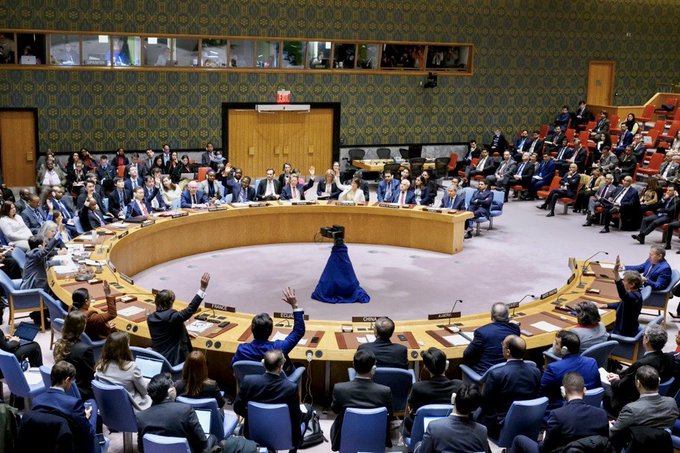The US allowed a UN resolution demanding a cessation of hostilities to pass, signaling that the president is starting to match rhetoric with action
Trita Parsi is the co-founder and Executive Vice president of the Quincy Institute for Responsible Statecraft.
Cross-posted from Responsible Statecraft
The United Nations Security Council finally managed to pass a resolution on Monday demanding an immediate ceasefire in Gaza — the first true indicator that pressure on President Biden to address the war’s calamities is working. The passing of the resolution was followed by spontaneous applause in the Security Council, which is highly unusual. The last time this happened was in 2003 when France’s Foreign Minister Dominique de Villepin gave a historic speech against the Iraq war. The applause reflects the immense exasperation with Biden’s efforts to keep the war going.
All countries supported the measure with the United States abstaining. Ten countries put forward the measure —Algeria, Guyana, Japan, Malta, Mozambique, Republic of Korea, Sierra Leone, Slovenia, and Switzerland — that is, all of the non-permanent members, or “elected members,” of the Security Council.
By Friday of last week, when Russia and China vetoed Biden’s draft resolution, the E10’s draft had three operative clauses: demanding an immediate ceasefire for the month of Ramadan, demanding the immediate and unconditional release of the hostages, and emphasizing the urgent need to expand the flow of humanitarian aid into Gaza.
Over the weekend, intense negotiations took place following a U.S. threat that it would veto any resolution that didn’t “support the diplomacy on the ground” — the diplomatic efforts of Qatar, Egypt, and the U.S. The Biden administration sought to link a ceasefire with the release of all hostages, that is, making progress on one issue depended on complete progress on the other.
This linkage could have made one issue hostage to the other. This is the Israeli position; it wants no pressure against its indiscriminate bombing of Gaza until all hostages are released, effectively making the entire population of Gaza hostages. The most immediate consequence of such a linkage is that the war and killing would continue since no issue can be resolved until all issues are resolved.
The other countries rejected the U.S. demand, insisting that both the release of hostages and a ceasefire are imperative and should not be linked, as it otherwise would provide justification for Israel’s indiscriminate bombing of Gaza since Hamas hasn’t released all hostages. (Which is why Israel and Biden have pushed for this linkage).
The resolution that passed does not accommodate the U.S. demand. Instead, it combines the two demands (ceasefire and hostage release) into one single operative clause, but without linking the two issues.
Here’s how the operative clause currently reads:
“Demands an immediate ceasefire for the month of Ramadan respected by all parties leading to a permanent sustainable ceasefire, and also demands the immediate and unconditional release of all hostages, as well as ensuring humanitarian access to address their medical and other humanitarian needs, and further demands that the parties comply with their obligations under international law in relation to all persons they detain.”
The Biden administration tried to change the language of the resolution to support the diplomatic efforts co-led by the U.S. But this is a process that thus far has been unsuccessful, partly because the U.S. has pushed its parameters to meet all Israeli demands. This includes linking a ceasefire with the release of all hostages, including male soldiers.
Again, the other countries have resisted, and the E10 resolution only acknowledges these diplomatic efforts rather than supporting them or deferring the Council’s responsibility to this process.
An African diplomat told me that the American draft resolution vetoed on Friday positioned the U.S.-led negotiations above the UNSC. The E10 rejected that proposal because they believe subordinating the U.N. Security Council to diplomatic processes preferred by the U.S. will delegitimize the legal authority of UNSC.
The fact that the U.S. abstained signifies the first instance in which we see Biden’s rhetorical shift in favor of a ceasefire translate into political action.
The question is how the passage of this resolution will impact U.S. policy in practice. Israeli Prime Minister Benjamin Netanyahu publicly threatened to cancel a delegation to Washington if Biden didn’t veto the resolution. (He subsequently followed through on his threat). It is noteworthy that the Israeli Prime Minister felt comfortable publicly threatening the U.S. while Biden, after Israel has engaged in extensive war crimes using U.S. weapons and undermined U.S. interests, has not even been able to muster the courage to issue a meaningful warning to Israel.
But will the U.S. still continue to sell arms to Israel, even if Israel continues to refuse a ceasefire? Legally, the resolution does not oblige the U.S. to cease arms sales, but politically, there will be added pressure on Washington to help implement the resolution rather than simply acting as a bystander of a ceasefire.
The Biden administration has dismissed all accusations of Israel committing war crimes by declaring that Israel has a right to defend itself. But with the UNSC demanding a ceasefire, will it be more difficult for Biden to continue to turn a blind eye to Israel’s indiscriminate killings in Gaza?



Be the first to comment